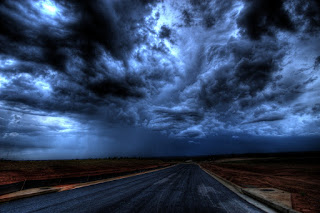Darkness
The darkness still resonates. Psalm 88 is
the psalm for the depressed. It is called the darkest psalm of the Bible (Psalm
39 being the next closest).
It begins
in lament and ends with tears. Its final strain that trails off in the night: “my
companions have become darkness.”
It is God’s
grace to us in this psalm that he gives voice to our darkness. He has listened
to our questions, “Are your wonders known in the darkness, or your
righteousness in the land of forgetfulness?” (v. 12). “O LORD, why do you cast
my soul away? Why do you hide your face from me?” (v. 14). While our church
services may often give little space for lament, seemingly require a painted on
smile for those of us who wade through a darkening fog, our God gives us words
to say back to him in his own inspired Word.
The psalm
could be the prayer of the dying and ill (v. 3-5, 10, 15). The voice of the
depressed (v. 6, 7). The voice of the rejected and alone (v. 8, 18). The voice
of one suffering from their own sin (v. 14).
I think,
too, it is the voice of Christ.(1) I do not want to brush past the original
context, but surely Christ the Eternal Word is present in his Word. And here
mystery. Linger with our Savior before his incarnation. As the Son by the Spirit
inspired these words to the original Israelite writer, what was crossing
through his mind? The Son’s own suffering etched on papyri proleptically? Love
for the Father, love for us, love that carried him through Gethsemane.
Surely we
can see the Messiah’s words on the cross.
O LORD, God
of my salvation—in the darkness of the cross, he still cried to his Father. John
Goldingay in his commentary on the psalms writes, “It is extraordinary that
this person keeps praying at all, and the psalm is an expression of
extraordinary faith” (2). Who can have such faith? The human heart is so frail!
But as the lament psalm 73 cries, God is the strength of our heart. Jesus
alone, perfect in faith, perfect in trust that his Father by the Spirit would raise
him and vindicate him.
You have
put me in the depths of the pit….Your wrath lies heavy on me—oh! that my
Savior tasted the agony of pain, the encroachment of death. The same cold claws
that wreak havoc in my body and in my friends with cancer, MS, autoimmune.
Death the king ruling in drugs and addiction. Death’s dark glee in separation and
broken relationships. Death’s dark fog eclipsing the sun in depression. Death the
master of eternal lake of fire. Jesus took the cup of wrath, its poison in his
body but yet he greater. But he knew it in flesh.
He is close
to us in our suffering for he bore it, every last drop. My tears do not fall
alone, but they fell on him, through him, and he took them all. The infinite
God in that single body, and he took it all.
You have
caused my companions to shun me—from Adam and Eve,
to Job, to the psalmists, to us, our suffering is compounded by its aloneness.
Perhaps that is the very worst part. Jesus, more alone than we ever will be,
for he the only perfect innocent one. No one understood, saw. There is a
dimension, a depth, far greater in his innocence. Peter, John, disciples ran. You
and I, Christ’s enemies. He alone. He shunned by all. But his death—he alone,
so that we could be reconciled. We the enemies, united to him for eternity.
Betrayers, now brothers.
As we still
echo this psalmist in the weary dark days, as its lament sirens over the dark
stormy waves, we know we do not sing alone.
The
Abandoned One, betrayed by disciples, will not abandon us.
The One Who
Conquered Death, will not let our soul nor body slip to sheol.
The One Who
Became Sin will never turn his face away from us
The One Who
Drank the cup of wrath has drank it all.
We do not
sing alone, for where we are, Christ our Head is as well. He will be close to
the brokenhearted and crushed in spirit, as this very book promises (Ps.
34:18). In all our affliction he was afflicted too (Isa. 63:9)—so says the
prophet Isaiah to his own rebellious people, exiled from their own sin. Even in
our own chosen consequences, so great our gracious High Priest he will walk
with us through that as well. We are one with him, so united that what happens
to us happens to him (Acts 9:5). The psalmist sang it, but his own suffering a
type of the Suffering Servant, Christ sang it, we sing it, but Christ sang it
once and for all. “In the morning my prayer comes before you” (v. 13)—and Christ’s
bright morning will come.
NOTES
(1) Nor am
I alone. Augustine saw it of Christ. So also Douglas Van Dorn in his recent
sermon at Northern Colorado Reformed Baptist Church.
(2) John Goldingay,
Psalms, (Grand Rapids, MI: Baker
Academic, 2007), 2:659.



Comments
Post a Comment